MG411: People Management in the NHS: Leadership, Training, Talent
VerifiedAdded on 2022/12/16
|9
|2478
|52
Report
AI Summary
This report delves into the intricacies of people management within the National Health Service (NHS), examining key aspects such as leadership models, training and development strategies, and talent management approaches. The report analyzes the application of these models within the current NHS scenario, considering the unique challenges and demands of the healthcare environment. It explores the roles and priorities of NHS management and HR functions, from administrative tasks to strategic planning, and assesses both internal and external influences on these areas. The conclusion provides recommendations for improving people management practices within the NHS, focusing on fostering employee engagement, promoting open communication, and eliminating bias to create a more effective and supportive work environment. The report is based on the MG411 module and addresses issues related to the 2018-19 academic year.

INTRODUCTION TO
PEOPLE MANAGEMENT
PEOPLE MANAGEMENT
Paraphrase This Document
Need a fresh take? Get an instant paraphrase of this document with our AI Paraphraser
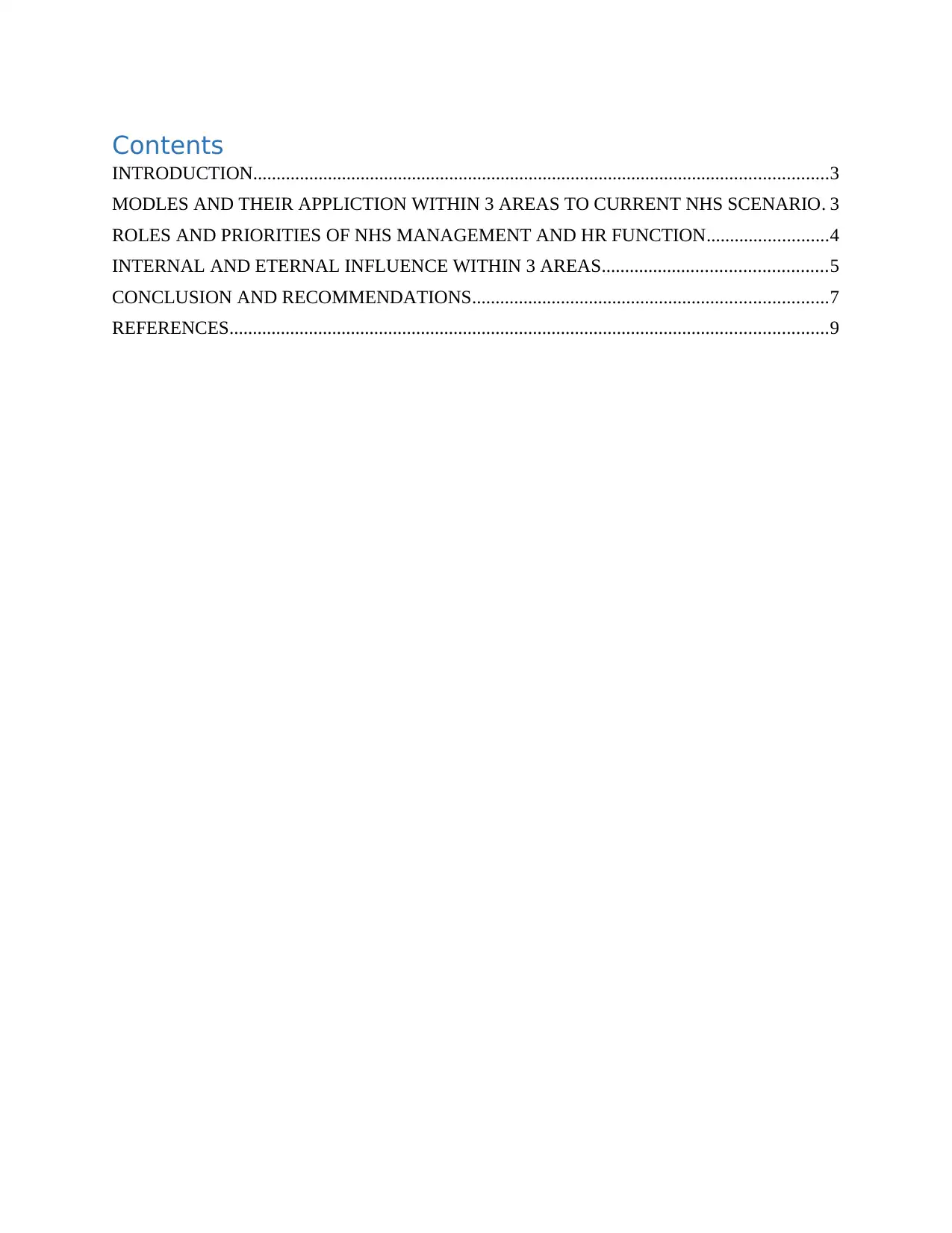
Contents
INTRODUCTION...........................................................................................................................3
MODLES AND THEIR APPLICTION WITHIN 3 AREAS TO CURRENT NHS SCENARIO. 3
ROLES AND PRIORITIES OF NHS MANAGEMENT AND HR FUNCTION..........................4
INTERNAL AND ETERNAL INFLUENCE WITHIN 3 AREAS................................................5
CONCLUSION AND RECOMMENDATIONS............................................................................7
REFERENCES................................................................................................................................9
INTRODUCTION...........................................................................................................................3
MODLES AND THEIR APPLICTION WITHIN 3 AREAS TO CURRENT NHS SCENARIO. 3
ROLES AND PRIORITIES OF NHS MANAGEMENT AND HR FUNCTION..........................4
INTERNAL AND ETERNAL INFLUENCE WITHIN 3 AREAS................................................5
CONCLUSION AND RECOMMENDATIONS............................................................................7
REFERENCES................................................................................................................................9
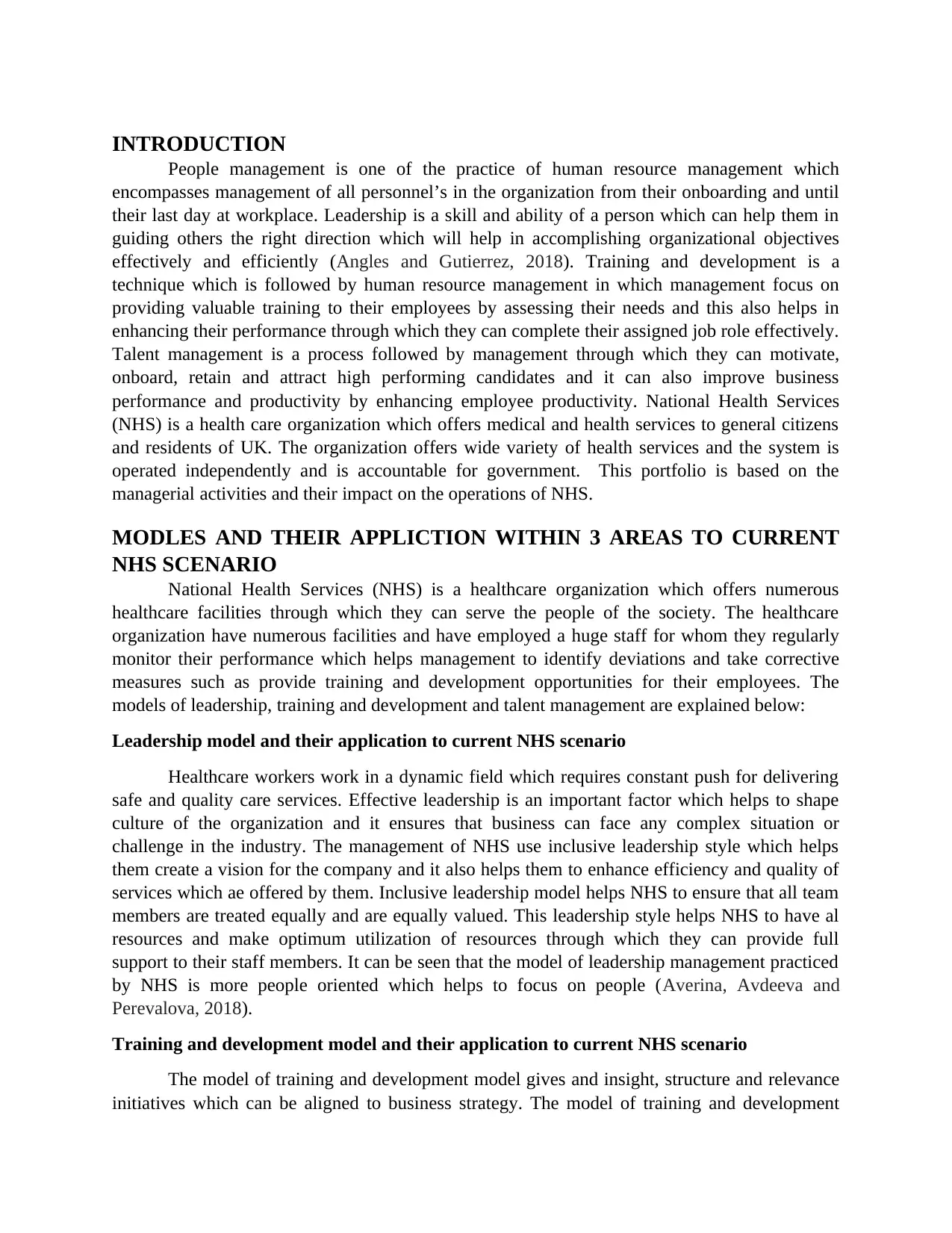
INTRODUCTION
People management is one of the practice of human resource management which
encompasses management of all personnel’s in the organization from their onboarding and until
their last day at workplace. Leadership is a skill and ability of a person which can help them in
guiding others the right direction which will help in accomplishing organizational objectives
effectively and efficiently (Angles and Gutierrez, 2018). Training and development is a
technique which is followed by human resource management in which management focus on
providing valuable training to their employees by assessing their needs and this also helps in
enhancing their performance through which they can complete their assigned job role effectively.
Talent management is a process followed by management through which they can motivate,
onboard, retain and attract high performing candidates and it can also improve business
performance and productivity by enhancing employee productivity. National Health Services
(NHS) is a health care organization which offers medical and health services to general citizens
and residents of UK. The organization offers wide variety of health services and the system is
operated independently and is accountable for government. This portfolio is based on the
managerial activities and their impact on the operations of NHS.
MODLES AND THEIR APPLICTION WITHIN 3 AREAS TO CURRENT
NHS SCENARIO
National Health Services (NHS) is a healthcare organization which offers numerous
healthcare facilities through which they can serve the people of the society. The healthcare
organization have numerous facilities and have employed a huge staff for whom they regularly
monitor their performance which helps management to identify deviations and take corrective
measures such as provide training and development opportunities for their employees. The
models of leadership, training and development and talent management are explained below:
Leadership model and their application to current NHS scenario
Healthcare workers work in a dynamic field which requires constant push for delivering
safe and quality care services. Effective leadership is an important factor which helps to shape
culture of the organization and it ensures that business can face any complex situation or
challenge in the industry. The management of NHS use inclusive leadership style which helps
them create a vision for the company and it also helps them to enhance efficiency and quality of
services which ae offered by them. Inclusive leadership model helps NHS to ensure that all team
members are treated equally and are equally valued. This leadership style helps NHS to have al
resources and make optimum utilization of resources through which they can provide full
support to their staff members. It can be seen that the model of leadership management practiced
by NHS is more people oriented which helps to focus on people (Averina, Avdeeva and
Perevalova, 2018).
Training and development model and their application to current NHS scenario
The model of training and development model gives and insight, structure and relevance
initiatives which can be aligned to business strategy. The model of training and development
People management is one of the practice of human resource management which
encompasses management of all personnel’s in the organization from their onboarding and until
their last day at workplace. Leadership is a skill and ability of a person which can help them in
guiding others the right direction which will help in accomplishing organizational objectives
effectively and efficiently (Angles and Gutierrez, 2018). Training and development is a
technique which is followed by human resource management in which management focus on
providing valuable training to their employees by assessing their needs and this also helps in
enhancing their performance through which they can complete their assigned job role effectively.
Talent management is a process followed by management through which they can motivate,
onboard, retain and attract high performing candidates and it can also improve business
performance and productivity by enhancing employee productivity. National Health Services
(NHS) is a health care organization which offers medical and health services to general citizens
and residents of UK. The organization offers wide variety of health services and the system is
operated independently and is accountable for government. This portfolio is based on the
managerial activities and their impact on the operations of NHS.
MODLES AND THEIR APPLICTION WITHIN 3 AREAS TO CURRENT
NHS SCENARIO
National Health Services (NHS) is a healthcare organization which offers numerous
healthcare facilities through which they can serve the people of the society. The healthcare
organization have numerous facilities and have employed a huge staff for whom they regularly
monitor their performance which helps management to identify deviations and take corrective
measures such as provide training and development opportunities for their employees. The
models of leadership, training and development and talent management are explained below:
Leadership model and their application to current NHS scenario
Healthcare workers work in a dynamic field which requires constant push for delivering
safe and quality care services. Effective leadership is an important factor which helps to shape
culture of the organization and it ensures that business can face any complex situation or
challenge in the industry. The management of NHS use inclusive leadership style which helps
them create a vision for the company and it also helps them to enhance efficiency and quality of
services which ae offered by them. Inclusive leadership model helps NHS to ensure that all team
members are treated equally and are equally valued. This leadership style helps NHS to have al
resources and make optimum utilization of resources through which they can provide full
support to their staff members. It can be seen that the model of leadership management practiced
by NHS is more people oriented which helps to focus on people (Averina, Avdeeva and
Perevalova, 2018).
Training and development model and their application to current NHS scenario
The model of training and development model gives and insight, structure and relevance
initiatives which can be aligned to business strategy. The model of training and development
⊘ This is a preview!⊘
Do you want full access?
Subscribe today to unlock all pages.

Trusted by 1+ million students worldwide
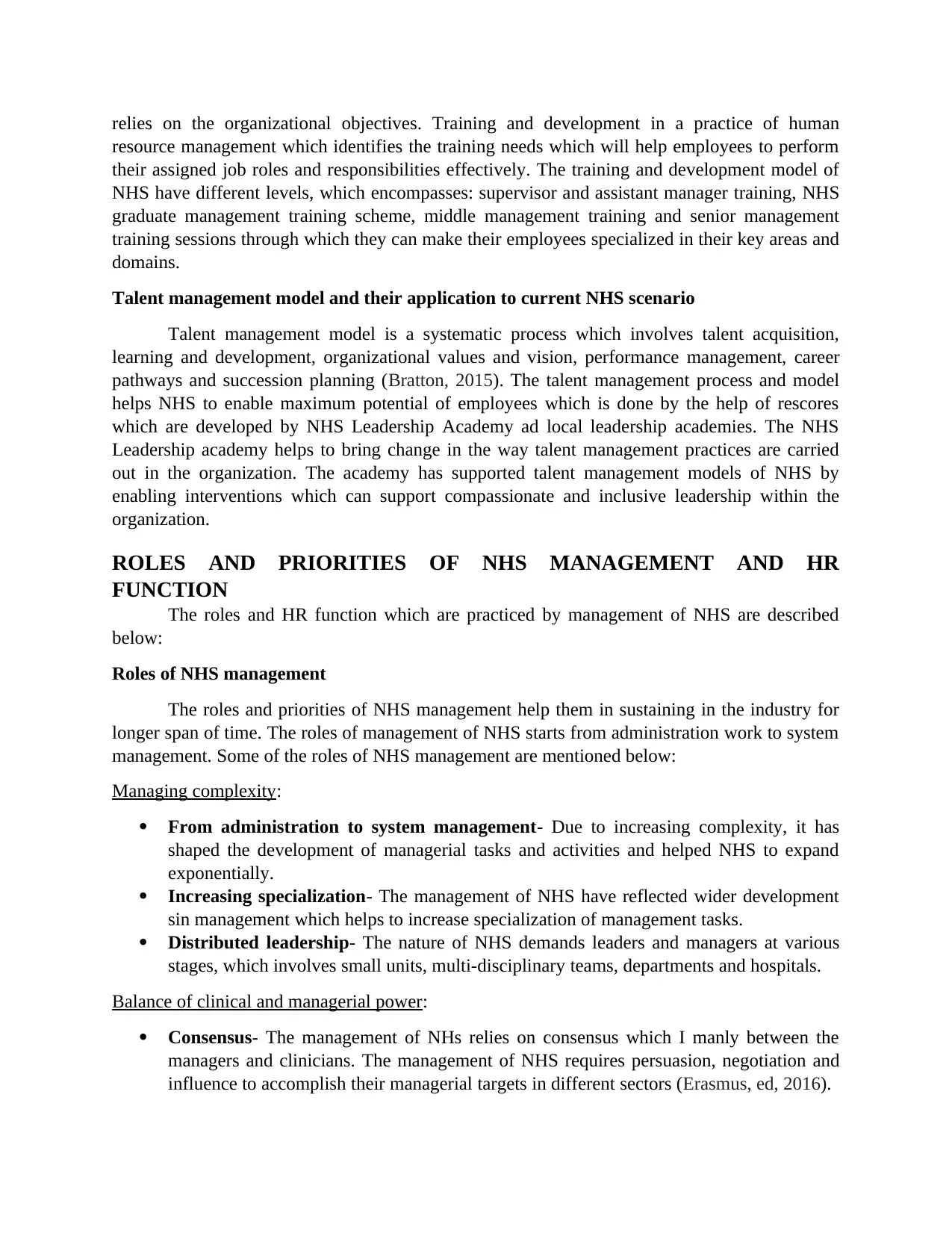
relies on the organizational objectives. Training and development in a practice of human
resource management which identifies the training needs which will help employees to perform
their assigned job roles and responsibilities effectively. The training and development model of
NHS have different levels, which encompasses: supervisor and assistant manager training, NHS
graduate management training scheme, middle management training and senior management
training sessions through which they can make their employees specialized in their key areas and
domains.
Talent management model and their application to current NHS scenario
Talent management model is a systematic process which involves talent acquisition,
learning and development, organizational values and vision, performance management, career
pathways and succession planning (Bratton, 2015). The talent management process and model
helps NHS to enable maximum potential of employees which is done by the help of rescores
which are developed by NHS Leadership Academy ad local leadership academies. The NHS
Leadership academy helps to bring change in the way talent management practices are carried
out in the organization. The academy has supported talent management models of NHS by
enabling interventions which can support compassionate and inclusive leadership within the
organization.
ROLES AND PRIORITIES OF NHS MANAGEMENT AND HR
FUNCTION
The roles and HR function which are practiced by management of NHS are described
below:
Roles of NHS management
The roles and priorities of NHS management help them in sustaining in the industry for
longer span of time. The roles of management of NHS starts from administration work to system
management. Some of the roles of NHS management are mentioned below:
Managing complexity:
From administration to system management- Due to increasing complexity, it has
shaped the development of managerial tasks and activities and helped NHS to expand
exponentially.
Increasing specialization- The management of NHS have reflected wider development
sin management which helps to increase specialization of management tasks.
Distributed leadership- The nature of NHS demands leaders and managers at various
stages, which involves small units, multi-disciplinary teams, departments and hospitals.
Balance of clinical and managerial power:
Consensus- The management of NHs relies on consensus which I manly between the
managers and clinicians. The management of NHS requires persuasion, negotiation and
influence to accomplish their managerial targets in different sectors (Erasmus, ed, 2016).
resource management which identifies the training needs which will help employees to perform
their assigned job roles and responsibilities effectively. The training and development model of
NHS have different levels, which encompasses: supervisor and assistant manager training, NHS
graduate management training scheme, middle management training and senior management
training sessions through which they can make their employees specialized in their key areas and
domains.
Talent management model and their application to current NHS scenario
Talent management model is a systematic process which involves talent acquisition,
learning and development, organizational values and vision, performance management, career
pathways and succession planning (Bratton, 2015). The talent management process and model
helps NHS to enable maximum potential of employees which is done by the help of rescores
which are developed by NHS Leadership Academy ad local leadership academies. The NHS
Leadership academy helps to bring change in the way talent management practices are carried
out in the organization. The academy has supported talent management models of NHS by
enabling interventions which can support compassionate and inclusive leadership within the
organization.
ROLES AND PRIORITIES OF NHS MANAGEMENT AND HR
FUNCTION
The roles and HR function which are practiced by management of NHS are described
below:
Roles of NHS management
The roles and priorities of NHS management help them in sustaining in the industry for
longer span of time. The roles of management of NHS starts from administration work to system
management. Some of the roles of NHS management are mentioned below:
Managing complexity:
From administration to system management- Due to increasing complexity, it has
shaped the development of managerial tasks and activities and helped NHS to expand
exponentially.
Increasing specialization- The management of NHS have reflected wider development
sin management which helps to increase specialization of management tasks.
Distributed leadership- The nature of NHS demands leaders and managers at various
stages, which involves small units, multi-disciplinary teams, departments and hospitals.
Balance of clinical and managerial power:
Consensus- The management of NHs relies on consensus which I manly between the
managers and clinicians. The management of NHS requires persuasion, negotiation and
influence to accomplish their managerial targets in different sectors (Erasmus, ed, 2016).
Paraphrase This Document
Need a fresh take? Get an instant paraphrase of this document with our AI Paraphraser
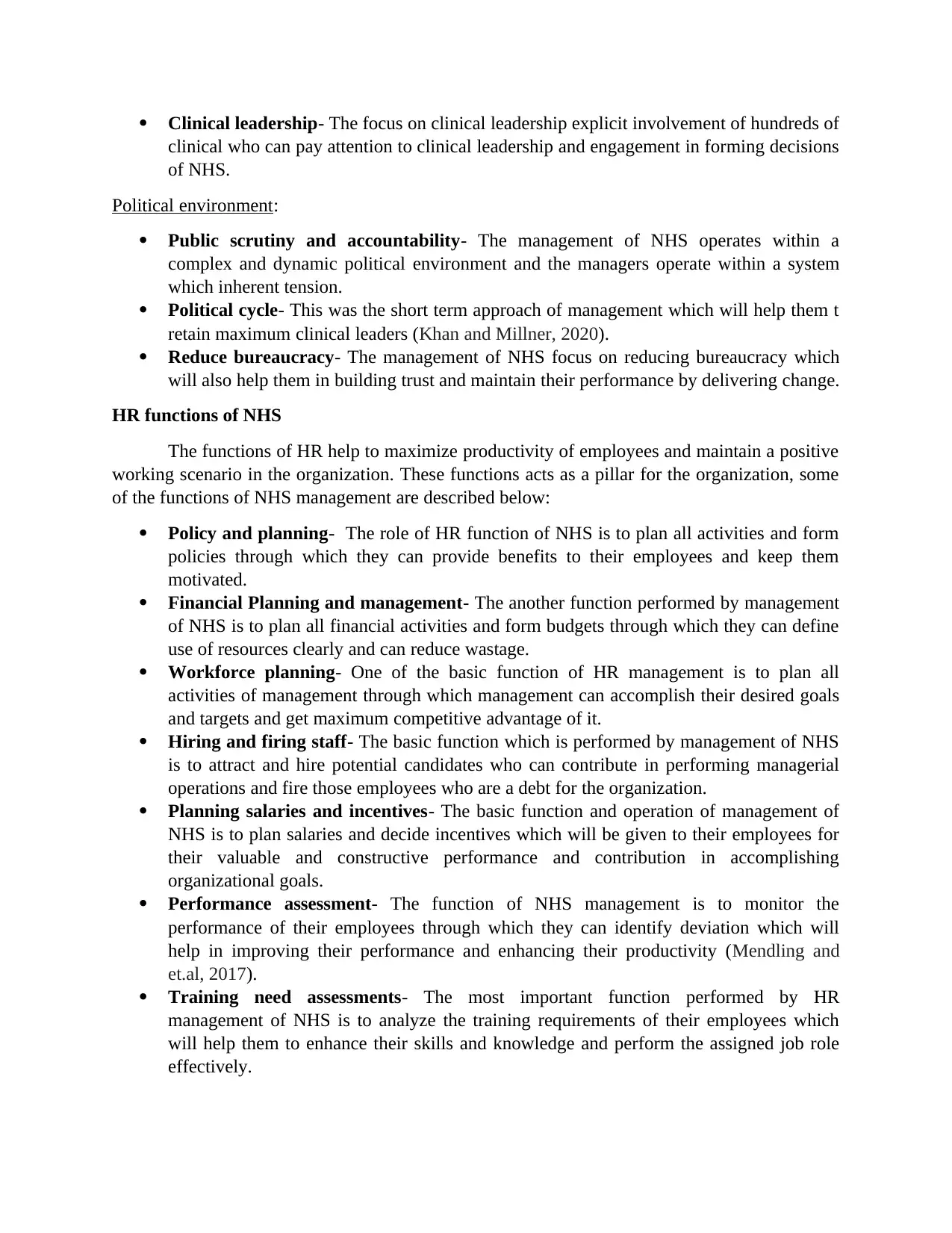
Clinical leadership- The focus on clinical leadership explicit involvement of hundreds of
clinical who can pay attention to clinical leadership and engagement in forming decisions
of NHS.
Political environment:
Public scrutiny and accountability- The management of NHS operates within a
complex and dynamic political environment and the managers operate within a system
which inherent tension.
Political cycle- This was the short term approach of management which will help them t
retain maximum clinical leaders (Khan and Millner, 2020).
Reduce bureaucracy- The management of NHS focus on reducing bureaucracy which
will also help them in building trust and maintain their performance by delivering change.
HR functions of NHS
The functions of HR help to maximize productivity of employees and maintain a positive
working scenario in the organization. These functions acts as a pillar for the organization, some
of the functions of NHS management are described below:
Policy and planning- The role of HR function of NHS is to plan all activities and form
policies through which they can provide benefits to their employees and keep them
motivated.
Financial Planning and management- The another function performed by management
of NHS is to plan all financial activities and form budgets through which they can define
use of resources clearly and can reduce wastage.
Workforce planning- One of the basic function of HR management is to plan all
activities of management through which management can accomplish their desired goals
and targets and get maximum competitive advantage of it.
Hiring and firing staff- The basic function which is performed by management of NHS
is to attract and hire potential candidates who can contribute in performing managerial
operations and fire those employees who are a debt for the organization.
Planning salaries and incentives- The basic function and operation of management of
NHS is to plan salaries and decide incentives which will be given to their employees for
their valuable and constructive performance and contribution in accomplishing
organizational goals.
Performance assessment- The function of NHS management is to monitor the
performance of their employees through which they can identify deviation which will
help in improving their performance and enhancing their productivity (Mendling and
et.al, 2017).
Training need assessments- The most important function performed by HR
management of NHS is to analyze the training requirements of their employees which
will help them to enhance their skills and knowledge and perform the assigned job role
effectively.
clinical who can pay attention to clinical leadership and engagement in forming decisions
of NHS.
Political environment:
Public scrutiny and accountability- The management of NHS operates within a
complex and dynamic political environment and the managers operate within a system
which inherent tension.
Political cycle- This was the short term approach of management which will help them t
retain maximum clinical leaders (Khan and Millner, 2020).
Reduce bureaucracy- The management of NHS focus on reducing bureaucracy which
will also help them in building trust and maintain their performance by delivering change.
HR functions of NHS
The functions of HR help to maximize productivity of employees and maintain a positive
working scenario in the organization. These functions acts as a pillar for the organization, some
of the functions of NHS management are described below:
Policy and planning- The role of HR function of NHS is to plan all activities and form
policies through which they can provide benefits to their employees and keep them
motivated.
Financial Planning and management- The another function performed by management
of NHS is to plan all financial activities and form budgets through which they can define
use of resources clearly and can reduce wastage.
Workforce planning- One of the basic function of HR management is to plan all
activities of management through which management can accomplish their desired goals
and targets and get maximum competitive advantage of it.
Hiring and firing staff- The basic function which is performed by management of NHS
is to attract and hire potential candidates who can contribute in performing managerial
operations and fire those employees who are a debt for the organization.
Planning salaries and incentives- The basic function and operation of management of
NHS is to plan salaries and decide incentives which will be given to their employees for
their valuable and constructive performance and contribution in accomplishing
organizational goals.
Performance assessment- The function of NHS management is to monitor the
performance of their employees through which they can identify deviation which will
help in improving their performance and enhancing their productivity (Mendling and
et.al, 2017).
Training need assessments- The most important function performed by HR
management of NHS is to analyze the training requirements of their employees which
will help them to enhance their skills and knowledge and perform the assigned job role
effectively.
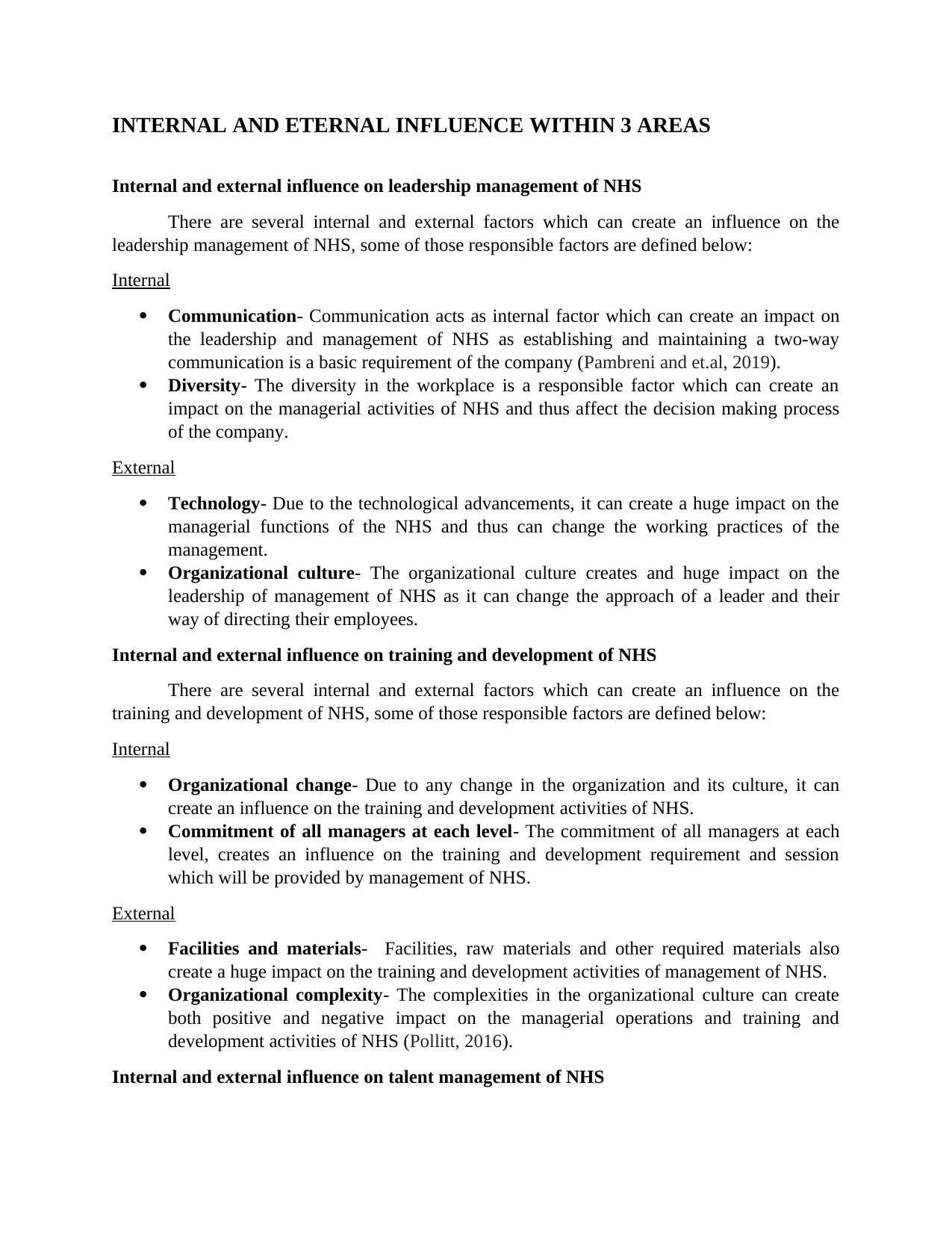
INTERNAL AND ETERNAL INFLUENCE WITHIN 3 AREAS
Internal and external influence on leadership management of NHS
There are several internal and external factors which can create an influence on the
leadership management of NHS, some of those responsible factors are defined below:
Internal
Communication- Communication acts as internal factor which can create an impact on
the leadership and management of NHS as establishing and maintaining a two-way
communication is a basic requirement of the company (Pambreni and et.al, 2019).
Diversity- The diversity in the workplace is a responsible factor which can create an
impact on the managerial activities of NHS and thus affect the decision making process
of the company.
External
Technology- Due to the technological advancements, it can create a huge impact on the
managerial functions of the NHS and thus can change the working practices of the
management.
Organizational culture- The organizational culture creates and huge impact on the
leadership of management of NHS as it can change the approach of a leader and their
way of directing their employees.
Internal and external influence on training and development of NHS
There are several internal and external factors which can create an influence on the
training and development of NHS, some of those responsible factors are defined below:
Internal
Organizational change- Due to any change in the organization and its culture, it can
create an influence on the training and development activities of NHS.
Commitment of all managers at each level- The commitment of all managers at each
level, creates an influence on the training and development requirement and session
which will be provided by management of NHS.
External
Facilities and materials- Facilities, raw materials and other required materials also
create a huge impact on the training and development activities of management of NHS.
Organizational complexity- The complexities in the organizational culture can create
both positive and negative impact on the managerial operations and training and
development activities of NHS (Pollitt, 2016).
Internal and external influence on talent management of NHS
Internal and external influence on leadership management of NHS
There are several internal and external factors which can create an influence on the
leadership management of NHS, some of those responsible factors are defined below:
Internal
Communication- Communication acts as internal factor which can create an impact on
the leadership and management of NHS as establishing and maintaining a two-way
communication is a basic requirement of the company (Pambreni and et.al, 2019).
Diversity- The diversity in the workplace is a responsible factor which can create an
impact on the managerial activities of NHS and thus affect the decision making process
of the company.
External
Technology- Due to the technological advancements, it can create a huge impact on the
managerial functions of the NHS and thus can change the working practices of the
management.
Organizational culture- The organizational culture creates and huge impact on the
leadership of management of NHS as it can change the approach of a leader and their
way of directing their employees.
Internal and external influence on training and development of NHS
There are several internal and external factors which can create an influence on the
training and development of NHS, some of those responsible factors are defined below:
Internal
Organizational change- Due to any change in the organization and its culture, it can
create an influence on the training and development activities of NHS.
Commitment of all managers at each level- The commitment of all managers at each
level, creates an influence on the training and development requirement and session
which will be provided by management of NHS.
External
Facilities and materials- Facilities, raw materials and other required materials also
create a huge impact on the training and development activities of management of NHS.
Organizational complexity- The complexities in the organizational culture can create
both positive and negative impact on the managerial operations and training and
development activities of NHS (Pollitt, 2016).
Internal and external influence on talent management of NHS
⊘ This is a preview!⊘
Do you want full access?
Subscribe today to unlock all pages.

Trusted by 1+ million students worldwide
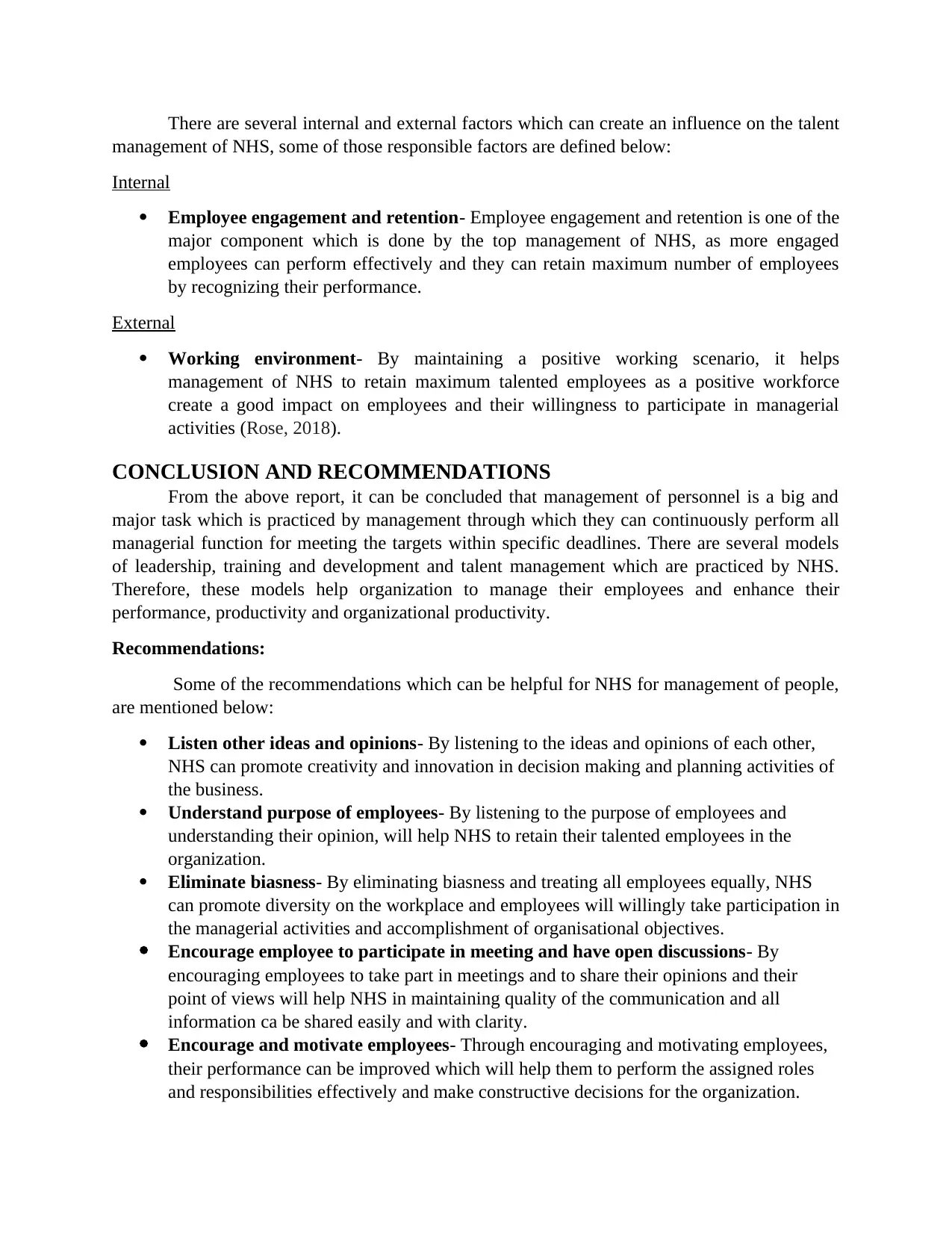
There are several internal and external factors which can create an influence on the talent
management of NHS, some of those responsible factors are defined below:
Internal
Employee engagement and retention- Employee engagement and retention is one of the
major component which is done by the top management of NHS, as more engaged
employees can perform effectively and they can retain maximum number of employees
by recognizing their performance.
External
Working environment- By maintaining a positive working scenario, it helps
management of NHS to retain maximum talented employees as a positive workforce
create a good impact on employees and their willingness to participate in managerial
activities (Rose, 2018).
CONCLUSION AND RECOMMENDATIONS
From the above report, it can be concluded that management of personnel is a big and
major task which is practiced by management through which they can continuously perform all
managerial function for meeting the targets within specific deadlines. There are several models
of leadership, training and development and talent management which are practiced by NHS.
Therefore, these models help organization to manage their employees and enhance their
performance, productivity and organizational productivity.
Recommendations:
Some of the recommendations which can be helpful for NHS for management of people,
are mentioned below:
Listen other ideas and opinions- By listening to the ideas and opinions of each other,
NHS can promote creativity and innovation in decision making and planning activities of
the business.
Understand purpose of employees- By listening to the purpose of employees and
understanding their opinion, will help NHS to retain their talented employees in the
organization.
Eliminate biasness- By eliminating biasness and treating all employees equally, NHS
can promote diversity on the workplace and employees will willingly take participation in
the managerial activities and accomplishment of organisational objectives.
Encourage employee to participate in meeting and have open discussions- By
encouraging employees to take part in meetings and to share their opinions and their
point of views will help NHS in maintaining quality of the communication and all
information ca be shared easily and with clarity.
Encourage and motivate employees- Through encouraging and motivating employees,
their performance can be improved which will help them to perform the assigned roles
and responsibilities effectively and make constructive decisions for the organization.
management of NHS, some of those responsible factors are defined below:
Internal
Employee engagement and retention- Employee engagement and retention is one of the
major component which is done by the top management of NHS, as more engaged
employees can perform effectively and they can retain maximum number of employees
by recognizing their performance.
External
Working environment- By maintaining a positive working scenario, it helps
management of NHS to retain maximum talented employees as a positive workforce
create a good impact on employees and their willingness to participate in managerial
activities (Rose, 2018).
CONCLUSION AND RECOMMENDATIONS
From the above report, it can be concluded that management of personnel is a big and
major task which is practiced by management through which they can continuously perform all
managerial function for meeting the targets within specific deadlines. There are several models
of leadership, training and development and talent management which are practiced by NHS.
Therefore, these models help organization to manage their employees and enhance their
performance, productivity and organizational productivity.
Recommendations:
Some of the recommendations which can be helpful for NHS for management of people,
are mentioned below:
Listen other ideas and opinions- By listening to the ideas and opinions of each other,
NHS can promote creativity and innovation in decision making and planning activities of
the business.
Understand purpose of employees- By listening to the purpose of employees and
understanding their opinion, will help NHS to retain their talented employees in the
organization.
Eliminate biasness- By eliminating biasness and treating all employees equally, NHS
can promote diversity on the workplace and employees will willingly take participation in
the managerial activities and accomplishment of organisational objectives.
Encourage employee to participate in meeting and have open discussions- By
encouraging employees to take part in meetings and to share their opinions and their
point of views will help NHS in maintaining quality of the communication and all
information ca be shared easily and with clarity.
Encourage and motivate employees- Through encouraging and motivating employees,
their performance can be improved which will help them to perform the assigned roles
and responsibilities effectively and make constructive decisions for the organization.
Paraphrase This Document
Need a fresh take? Get an instant paraphrase of this document with our AI Paraphraser
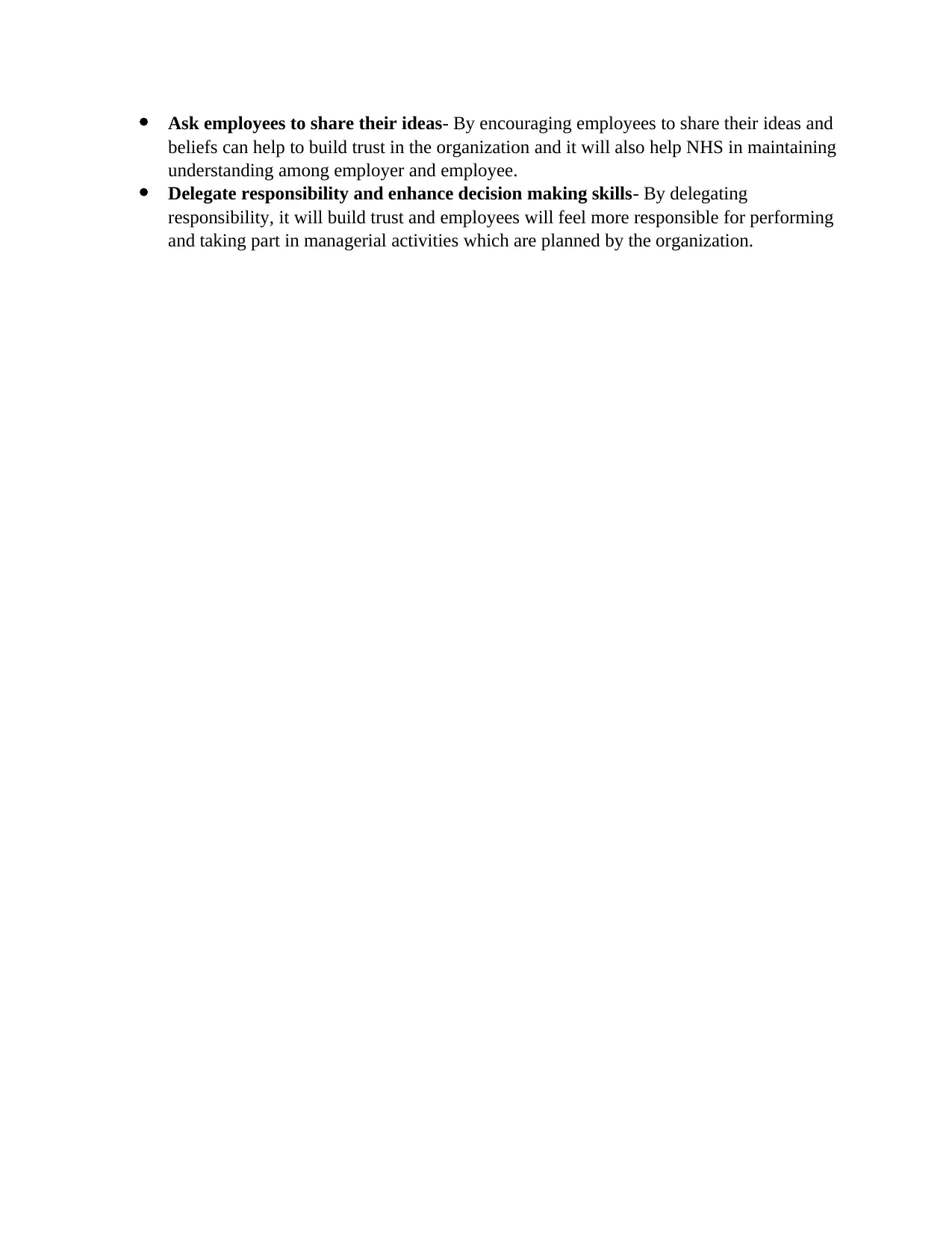
Ask employees to share their ideas- By encouraging employees to share their ideas and
beliefs can help to build trust in the organization and it will also help NHS in maintaining
understanding among employer and employee.
Delegate responsibility and enhance decision making skills- By delegating
responsibility, it will build trust and employees will feel more responsible for performing
and taking part in managerial activities which are planned by the organization.
beliefs can help to build trust in the organization and it will also help NHS in maintaining
understanding among employer and employee.
Delegate responsibility and enhance decision making skills- By delegating
responsibility, it will build trust and employees will feel more responsible for performing
and taking part in managerial activities which are planned by the organization.
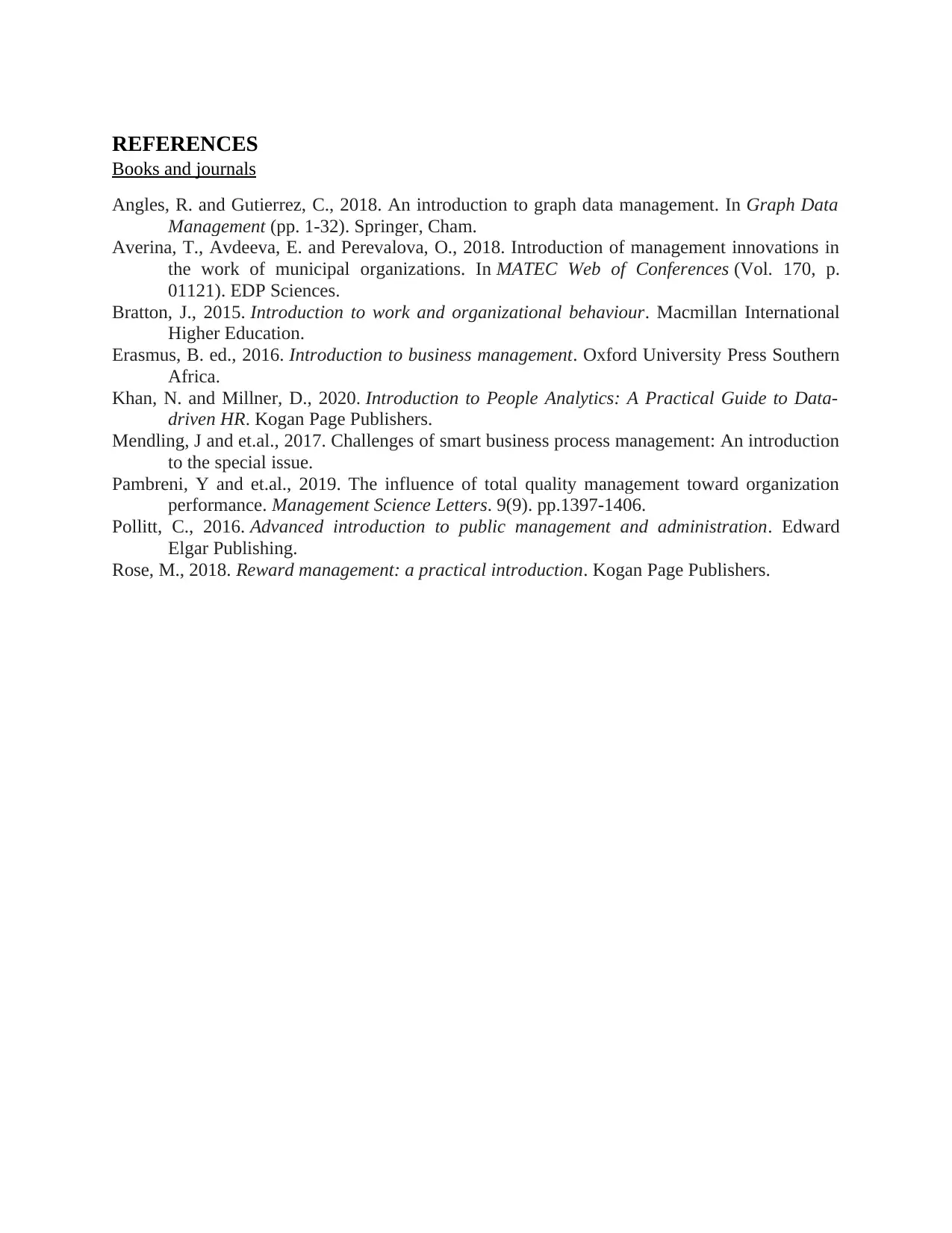
REFERENCES
Books and journals
Angles, R. and Gutierrez, C., 2018. An introduction to graph data management. In Graph Data
Management (pp. 1-32). Springer, Cham.
Averina, T., Avdeeva, E. and Perevalova, O., 2018. Introduction of management innovations in
the work of municipal organizations. In MATEC Web of Conferences (Vol. 170, p.
01121). EDP Sciences.
Bratton, J., 2015. Introduction to work and organizational behaviour. Macmillan International
Higher Education.
Erasmus, B. ed., 2016. Introduction to business management. Oxford University Press Southern
Africa.
Khan, N. and Millner, D., 2020. Introduction to People Analytics: A Practical Guide to Data-
driven HR. Kogan Page Publishers.
Mendling, J and et.al., 2017. Challenges of smart business process management: An introduction
to the special issue.
Pambreni, Y and et.al., 2019. The influence of total quality management toward organization
performance. Management Science Letters. 9(9). pp.1397-1406.
Pollitt, C., 2016. Advanced introduction to public management and administration. Edward
Elgar Publishing.
Rose, M., 2018. Reward management: a practical introduction. Kogan Page Publishers.
Books and journals
Angles, R. and Gutierrez, C., 2018. An introduction to graph data management. In Graph Data
Management (pp. 1-32). Springer, Cham.
Averina, T., Avdeeva, E. and Perevalova, O., 2018. Introduction of management innovations in
the work of municipal organizations. In MATEC Web of Conferences (Vol. 170, p.
01121). EDP Sciences.
Bratton, J., 2015. Introduction to work and organizational behaviour. Macmillan International
Higher Education.
Erasmus, B. ed., 2016. Introduction to business management. Oxford University Press Southern
Africa.
Khan, N. and Millner, D., 2020. Introduction to People Analytics: A Practical Guide to Data-
driven HR. Kogan Page Publishers.
Mendling, J and et.al., 2017. Challenges of smart business process management: An introduction
to the special issue.
Pambreni, Y and et.al., 2019. The influence of total quality management toward organization
performance. Management Science Letters. 9(9). pp.1397-1406.
Pollitt, C., 2016. Advanced introduction to public management and administration. Edward
Elgar Publishing.
Rose, M., 2018. Reward management: a practical introduction. Kogan Page Publishers.
⊘ This is a preview!⊘
Do you want full access?
Subscribe today to unlock all pages.

Trusted by 1+ million students worldwide
1 out of 9
Related Documents
Your All-in-One AI-Powered Toolkit for Academic Success.
+13062052269
info@desklib.com
Available 24*7 on WhatsApp / Email
![[object Object]](/_next/static/media/star-bottom.7253800d.svg)
Unlock your academic potential
Copyright © 2020–2026 A2Z Services. All Rights Reserved. Developed and managed by ZUCOL.





